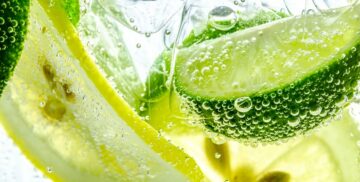With a lot of brands green-washing to make themselves look more appealing to climate-conscious consumers, doing your weekly shopping can be a bit tricky. Especially when it comes to choosing a plant milk for your morning cuppa. Is there really a massive difference when it comes to milk alternatives? And could hemp milk be the sustainable queen that we’ve all been waiting for?
Is “Sustainability” Just Another Buzzword?
When it comes to plant milk, we seem to be seeing the term “sustainable” thrown about quite a lot. But what does it actually mean? Is it just another marketing ploy to get us to buy certain products? Or is it something that we should be paying attention to?
To put it simply, the concept of sustainability just means looking after our own needs, without taking away from future generations. It’s about being more conscious of how we manage our resources. And making sure future generations are able to get what they need too.
You might have seen sustainability linked to environmentalism, but there’s a little more to it than that. We’re sure you’ve seen campaigns encouraging people to ditch single-use plastics in favour of reusable options, in a bid to save sea turtles. Whilst caring for wildlife and combating climate change is a big part of sustainability, we also need to factor in the need for social equity and economic development.
How Do We Know Which Plant Milk Is the Most Sustainable?
So, how do we figure out which plant milks are the most sustainable option? To do this, we look at a couple of different factors:
- How much water do they need to grow?
- How much land do they need to grow?
- Is there any chemical runoff from fertilizers?
- Do they contribute to soil erosion or degradation?
- Transport of raw materials and finished goods
- Do they produce a lot of greenhouse gases (GHG)?
- Do they generate a lot of waste?
- Availability of resources needed
- Worker rights
It sounds like a lot to take into consideration when you’re standing in the vegan aisle in Tesco. Especially when you're facing an entire wall of plant milk options. But essentially, you’ll want to go for the plant milk that can be produced without causing too much harm to the environment and the local people, where the crops are farmed.
To make your life easier, we’ve divided up the most popular plant milk options on the market. That way we can take a look at the pros and cons of each, and we can see how hemp milk stacks up against the rest!
Almond Milk
Almond milk is a firm favourite for coffee-lovers as it adds a sweet, nutty layer to your morning flat white. But how does it fare when it comes to sustainability?
Almonds are not only delicious, they’re also packed with nutrients. Which is part of the reason why they’ve become so popular in recent years.
However, when it comes to sustainability, they might not be the best choice. Almonds, like other nuts, grow on trees. We know it sounds weird, but google it! But because they grow on trees, they need an awful lot of water to grow. This in itself is not a huge turn-off, but it complicates things a little bit.
The vast majority of almonds are grown in sunny California, about 80% of the world’s supply in fact. Whilst California has fabulous weather if you’re looking for a flawlessly golden tan, it’s known for facing serious water shortages. With the people of the region struggling with drought-like conditions on a regular basis, using large amounts of water to grow almonds for export is not great in terms of sustainability.
A recent study found that you would need approximately 2.3 gallons of water just for one California almond. But they’re super nutritious, does that make the water use worth it? When it comes to plant milks, unfortunately, no. The process that makes almonds into the beautiful plant milk that we love actually removes most of the nutrients. Unfortunately, meaning all the water was used in vain – yikes!
Opting for almond milk over other plant milk does have some upsides though. One of which is the low greenhouse gas emissions associated with growing and processing the nuts. They also require far less land than dairy cows, and some other plant milks.
Almond Milk Isn't the Best Plant Milk For Bees
If you’re vegan and you choose to avoid honey or related products because you’re concerned about the welfare of bees, we might have some bad news for you too. Almond trees are pollinated by bees. But as the nutty milk alternative becomes more popular, we need more bees to keep up with the workload.
This means there’s a lot more pressure on a bug that’s already under a lot of pressure. 70% of commercial bees in the US are involved in pollinating almond trees every spring. Unfortunately, last year it was estimated that up to a third of the bees involved died of the increased pressure.
So, almonds are not the worst, and they’re not the best on the sustainability scale. But if you can’t give up your daily almond milk latte, maybe opt for a milk that’s made using almonds from somewhere other than California – preferably somewhere where water isn’t scarce!
Soy Milk
Ah soy milk, the OG of plant milk! Soy milk has been around for an awfully long time, hailing from Asian countries, the bean is now grown all over the world.
Soy milk is possibly one of the most popular milk alternatives because of the taste and texture – it’s very similar to cow’s milk. This means it’s not a huge adjustment for people who want to swap from dairy to a more sustainable plant milk. But how does it stack up against the other plant milks?
On paper, soy milk is definitely up there with hemp milk in terms of sustainability. This is because growth and production produce low GHG emissions, and they use far less water than almonds. In fact, they use about a tenth of the water that almonds require!
Like other legumes, soybeans trap nitrogen in the soil. This is not only good for the soil, for future plants to grow, but it also means it reduces the need for fertilizers. Therefore, there’s less of a chance of chemical runoff into water sources!
Soy Milk – Great for Us but Not for the Planet
One of the major drawbacks associated with soy milk is the amount of land used to grow it. Yes, the plants need more room to grow than other crops like rice or almonds, but the issue lies more with the amount of land allocated to growing it.
Soy is a popular crop used in animal feed and the vast majority of soybeans are grown in America and exported to the rest of the world to feed cattle. Because of the high demand for soy, large areas of the Amazon rainforest have been destroyed to grow the crop. This deforestation is not only devastating for the indigenous peoples of the rainforest, local ecosystems and wildlife, but it can also result in soil erosion, higher temperatures, higher risk of forest fires, as well as releasing CO2 into the atmosphere.
Not all soybeans are bad though. Opting for soy milks that are made with organic, non-GMO soybeans, grown in the US or Canada can help make it a more sustainable choice.
Oat Milk
When it comes to plant milk, oat milk has become more popular. This could be because of its thick, creamy texture that is just perfect for baking or making iced lattes. Alternatively, it could be because it’s a slightly more nutritious option compared to almond milk.
In a study funded by Oatly (a Swedish oat milk producer), researchers found that oat milk produces 80% lower GHG emissions and requires 60% less energy in comparison to cow’s milk. The same study also found that we need up to 80% less land to grow the oats too! But how does it compare to other plant milks?
Oats are a relatively low input crop. This means they don’t need massive amounts of land, water, or energy to grow. In addition, oats are often grown in rotation with other crops. This crop diversity helps to protect the health of the soil as well as reducing the risk of soil erosion and plant disease.
Oat milk is a great plant milk option because growing the crops doesn't pose a threat to the environment or local people. Similarly, if you opt for organic oat milk, you’re reducing the risk of chemical runoff, helping to protect local wildlife too. However, in terms of nutrition, there are other milks that pack more of a punch.
Pea Milk
Pea milk is probably not something you see on every shop shelf, but it’s certainly becoming more popular. That’s because it has a host of pros and not many cons.
Peas are legumes, just like soybeans, therefore they have a lot of similarities. For example, both are rich in nutrients like protein, and they don’t require massive amounts of water. In fact, they use about 85% less water than almonds.
Peas, like soybeans, can use the nitrogen found in the atmosphere to produce plant cells, meaning they don’t need as much fertilizer as other crops. Fertilizers don’t just contribute to chemical runoff, but they also have a massive carbon footprint.
In addition, they trap nitrogen in the soil, keeping the soil nice and healthy for future crops. They also produce about half the amount of greenhouse gases that cow’s milk does.
However, these peas are not genetically modified, like most soybeans. This is because they are usually grown in warm, dry climates, and so they’re not plagued by as many pests. With the reduced use of pesticides comes the reduced risk of chemical runoff – brilliant! They’re also grown in areas that have plenty of water, so they’re not contributing to water scarcity.
Pea milk might not have the biggest space on the plant milk shelf just yet but it’s certainly one to watch in terms of sustainability! The only real problem that we could find with pea milk is that it’s hard to find, but we hope that this won’t be the case for long.
Hemp Milk
Now that we know how the most popular plant milks fare on the sustainability scale, let’s see how hemp milk stacks up!
As we know hemp seeds are packed with nutrients in terms of fatty acids and protein but how does it look in terms of sustainability? Well, hemp milk might be a bit of a dark horse.
Hemp plants require very little room to grow. In fact, some farmers believe it actually grows better in closer quarters as it leads to thicker stems. We can use these stems, like every other part of the plant, for a range of purposes from textiles and paper to plastic alternatives. This means there is very little wastage when growing hemp, rather than other plant milk crops.
Hemp plants are also easy to grow as they’re not fussy when it comes to climate and conditions, and they’re naturally resistant to most pests. Therefore, they don’t need a lot of fertilizers or pesticides to grow – meaning it’s ticked the eco-friendly box for us.
In terms of water, hemp does need more water than oat, soy or pea plants, but they don’t need as much as almonds or cows – so they sit somewhere in the middle. As the plants are easy to grow in a range of climates, it’s easy to grow them in areas with plenty of water available, meaning that the crop doesn’t impact local people and wildlife negatively.
Could Hemp Milk Be the Plant Milk Hero We Need?
One of the major drawbacks of hemp milk is that it is not yet widely available. One of the reasons for this is because it was illegal to cultivate the crops until very recently. Hopefully, as times (and laws) are changing, hemp milk will find its place on the shelf next to our other favourites. Not only does it taste great and it has a lovely creamy texture, it’s also good for us and the environment making it a sustainable option in our books!
Conclusion
When it comes to plant-based milk options, we are spoiled for choice. The supermarket shelf space for vegan-friendly alternative milks seems to be growing every day and we love to see it!
We just touched on the most popular plant milk options available here, but there are tonnes more out there, each with its own pros and cons. The choice is yours, try them all out and see which you prefer.








